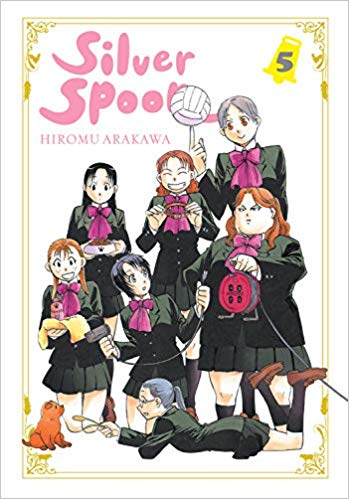By Hiromu Arakawa. Released in Japan as “Gin no Saji” by Shogakukan, serialization ongoing in the magazine Weekly Shonen Sunday. Released in North America by Yen Press. Translated by Amanda Haley.
I am fortunate enough to say that I am not one of those people who is naturally good at organization and so ends up completely buried when everyone comes to them and asks them to help/supervise/do everything. However, I am the son of such a person, so I am very familiar with how it works. It seems like it will be OK to take on something, and then one thing leads to another, and you find yourself taking on five other things. This is the dilemma that Hachiken is dealing with here. He’s nice, and competent, and doesn’t know how to say no, and everyone is independently asking him for help and now realizing that he’s getting piled on. So far everything seems to be holding up, but judging by the narrative, we’re headed for a nasty fall soon. But we’re not there yet, so we can all also revel in the joys of preparing for a cultural festival, ag school style.
There’s a big highlight in this book, as Hachiken is still learning how to ride that horse that seems to have it in for him. He’s not used to animals, and doesn’t understand how to interact with them or see that they’re even more important than the rider is. He thinks of horses like you would a car. As such, there’s a number of great scenes in this volume showing how much love and trust Mikage and the other riders give to their animals, and it helps him to see what’s missing from how he treats Chestnut. This also ties in with his self-esteem, as we see him freaking otu as everyone but him is able to manage the jumps – he’s seeing this as falling behind in class, and it’s VERY UPSETTING. Fortunately, Mikage and the others are able to show him what he’s missing. (There’s some romantic tease, but at this point Silver spoon isn’t really about that.)
Mikage and Komaba are still dealing with their own issues, though fortunately things seem to be OK betwen them and Hachiken again. (That said, no one has figured out why it happened – lack of communication is still a major obstacle among the main cast. Komaba is pouring his struggles into baseball, which is terrific… provided the team continues to win. Mikage seems to simply be giving up and accepting she won’t achieve her dream, which is even ore depressing. Dreams are important, even for a group of kids whose goals – take over the family farm – seem to be set in stone from the moment they’re born. This is why Hachiken arriving at school is great for both him and the other kids, as it leads to new perspectives. And also pet dogs. Because, as you’d expect from the running theme of this volume, Hachiken can’t say no to ANYONE.
Will we get a successful festival next time? Will Hachiken end up stressing out about everything? Will he and Mikage ever really talk to each other and not at each other? Not sure, but I can’t wait to find out.


It’s never explicitly stated in this volume, but I feel like on some level, Hachiken’s experience with Chestnut is meant to contrast with his earlier training of the puppy, as if to say not all animals are the same and should be respected for what they are. Great series, and good review ^^